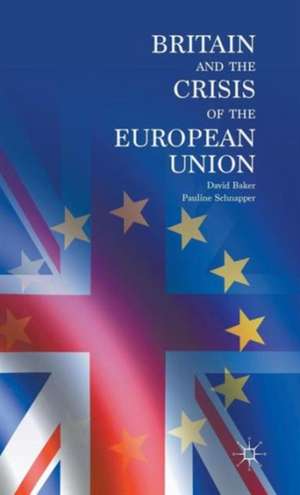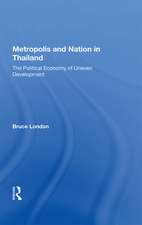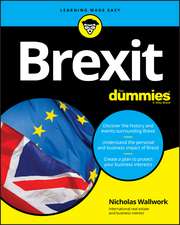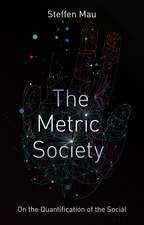Britain and the Crisis of the European Union
Autor David Baker, Pauline Schnapperen Limba Engleză Hardback – 4 aug 2015
Preț: 574.74 lei
Preț vechi: 676.16 lei
-15% Nou
Puncte Express: 862
Preț estimativ în valută:
110.03€ • 113.16$ • 91.28£
110.03€ • 113.16$ • 91.28£
Carte tipărită la comandă
Livrare economică 17 februarie-03 martie
Preluare comenzi: 021 569.72.76
Specificații
ISBN-13: 9781137005199
ISBN-10: 113700519X
Pagini: 248
Ilustrații: XI, 234 p.
Dimensiuni: 140 x 216 x 16 mm
Greutate: 0.44 kg
Ediția:1st ed. 2015
Editura: Palgrave Macmillan UK
Colecția Palgrave Macmillan
Locul publicării:London, United Kingdom
ISBN-10: 113700519X
Pagini: 248
Ilustrații: XI, 234 p.
Dimensiuni: 140 x 216 x 16 mm
Greutate: 0.44 kg
Ediția:1st ed. 2015
Editura: Palgrave Macmillan UK
Colecția Palgrave Macmillan
Locul publicării:London, United Kingdom
Cuprins
List of tables and figures
Acknowledgements
Introduction
1. A Multi-Faceted Crisis
2. Britain and Europe in a new Global Environment
3. Notes on Theory and Method
4. Intergovernmentalism and Historical Institutionalism
5. Comparative and Historical Political Economy
6. Outline
PART I: THE POLITICAL ECONOMY OF THE EUROZONE CRISIS
7. The Eurozone: A Crisis Waiting to Happen
8. The EZ Crisis – An Analytical Chronology
9. Phase One: From Maastricht to Meltdown
10. Phase Two: The Sovereign Debt Crisis
11. Solutions become problems
12. European Integration – From Embedded Liberalism to Variegated Neoliberalism
13. Conclusion: Winner Takes All, But at What Cost ?
PART II: BRITISH PREFERENCES IN THE EUROPEAN UNION: UNSUNG SUCCESS
14. Consequences of a Late Entry 1945-79
15. The Conservative Governments 1979-97
16. The New Labour Years
17. The Convention and Constitutional Treaty
18. Conclusion
PART III: EUROSCEPTICISM IN BRITAIN
19. British Euroscepticism
20. Divisions about Europe 1945-88
21. Blair and New Labour: An End to Divisions ?
22. The Conservative Party after 1997: the Drift towards Hard Euroscepticism
23. Public Opinion since the late 1990s
24. Conclusion
PART IV: THE CRISIS OF DEMOCRACY IN THE UNITED KINGDOM
25. Disillusionment and the Strains in the Political System
26. Fragmentation and Polarisation
27. The Effect of National and Global Trends
28. The Rise of Populist Parties
29. The Political Use of Referendums
30. Devolution and the Possible End of the British State
31. Conclusion
PART V: BRITAIN AND THE POLITICAL CRISIS IN THE EUROPEAN UNION
32. An Ongoing Academic Debate
33. Consequences of the Financial and Economic Crisis
34. Attempts to Respond to the ''Democratic Deficit''
35. Domestic Crises and the Fear of Globalisation
36. Conclusion
PART VI: BRITAIN AND THE ECONOMIC CRISIS IN THE EUROPEAN UNION
37. The View fromLondon
38. British Exceptionalism in the EU
39. Nation and Atlanticsm: the Exceptional Community
40. Nationhood and Sovereignty
41. A Alternative for Britain in the Global Economy ?
42. Hyperglobalism
43. Open Regionalism
44. Intergovernmentalism
45. Hyperglobalism: Will Winner Take All ?
46. Cameron''s Diplomacy in Europe and the Failure of Tory Statecraft
47. Semi-Detachment or ''Brexit'' ?
Conclusion
Bibliography
Acknowledgements
Introduction
1. A Multi-Faceted Crisis
2. Britain and Europe in a new Global Environment
3. Notes on Theory and Method
4. Intergovernmentalism and Historical Institutionalism
5. Comparative and Historical Political Economy
6. Outline
PART I: THE POLITICAL ECONOMY OF THE EUROZONE CRISIS
7. The Eurozone: A Crisis Waiting to Happen
8. The EZ Crisis – An Analytical Chronology
9. Phase One: From Maastricht to Meltdown
10. Phase Two: The Sovereign Debt Crisis
11. Solutions become problems
12. European Integration – From Embedded Liberalism to Variegated Neoliberalism
13. Conclusion: Winner Takes All, But at What Cost ?
PART II: BRITISH PREFERENCES IN THE EUROPEAN UNION: UNSUNG SUCCESS
14. Consequences of a Late Entry 1945-79
15. The Conservative Governments 1979-97
16. The New Labour Years
17. The Convention and Constitutional Treaty
18. Conclusion
PART III: EUROSCEPTICISM IN BRITAIN
19. British Euroscepticism
20. Divisions about Europe 1945-88
21. Blair and New Labour: An End to Divisions ?
22. The Conservative Party after 1997: the Drift towards Hard Euroscepticism
23. Public Opinion since the late 1990s
24. Conclusion
PART IV: THE CRISIS OF DEMOCRACY IN THE UNITED KINGDOM
25. Disillusionment and the Strains in the Political System
26. Fragmentation and Polarisation
27. The Effect of National and Global Trends
28. The Rise of Populist Parties
29. The Political Use of Referendums
30. Devolution and the Possible End of the British State
31. Conclusion
PART V: BRITAIN AND THE POLITICAL CRISIS IN THE EUROPEAN UNION
32. An Ongoing Academic Debate
33. Consequences of the Financial and Economic Crisis
34. Attempts to Respond to the ''Democratic Deficit''
35. Domestic Crises and the Fear of Globalisation
36. Conclusion
PART VI: BRITAIN AND THE ECONOMIC CRISIS IN THE EUROPEAN UNION
37. The View fromLondon
38. British Exceptionalism in the EU
39. Nation and Atlanticsm: the Exceptional Community
40. Nationhood and Sovereignty
41. A Alternative for Britain in the Global Economy ?
42. Hyperglobalism
43. Open Regionalism
44. Intergovernmentalism
45. Hyperglobalism: Will Winner Take All ?
46. Cameron''s Diplomacy in Europe and the Failure of Tory Statecraft
47. Semi-Detachment or ''Brexit'' ?
Conclusion
Bibliography
Recenzii
'The thirty year civil war in the Conservative Party over Britain's membership of the EU is reaching a climax. Baker and Schnapper provide a superb guide both to the bizarre British debate on Europe, and to the deepening crisis of the EU itself, showing how one feeds off the other. This book is essential reading for understanding the deep-seated problems which threaten to overwhelm the European project.' Andrew Gamble, Emeritus Professor of Politics, Department of Politics and International Studies, University of Cambridge, UK
'This outstanding book provides the most comprehensive analysis to date of the UK's troubled relationship with the European Union. Baker and Schnapper's rich analysis chronicles the complex party political, political economy and diplomatic dimensions of the British politics of European integration, while also showing how the EU's own crisis has fed back into and shaped domestic discourses on Europe. It is difficult to think of a better companion volumeas we approach the referendum on the UK's EU membership.' Ben Rosamond, Professor of Political Science, University of Copenhagen, Denmark
'This outstanding book provides the most comprehensive analysis to date of the UK's troubled relationship with the European Union. Baker and Schnapper's rich analysis chronicles the complex party political, political economy and diplomatic dimensions of the British politics of European integration, while also showing how the EU's own crisis has fed back into and shaped domestic discourses on Europe. It is difficult to think of a better companion volumeas we approach the referendum on the UK's EU membership.' Ben Rosamond, Professor of Political Science, University of Copenhagen, Denmark
Notă biografică
David Baker is a retired professor of Politics from the University of Warwick. In 1991 he founded (with Professor Andrew Gamble) the 'Members of Parliament Group' which researched the influence of euroscepticism on the major UK political parties, with a special focus on the Conservative Party. His research is based upon a political economy approach.
Pauline Schnapper is a Professor of British Studies at the University of Sorbonne Nouvelle Paris 3 and a fellow of the Institut Universitaire de France.
Pauline Schnapper is a Professor of British Studies at the University of Sorbonne Nouvelle Paris 3 and a fellow of the Institut Universitaire de France.




















